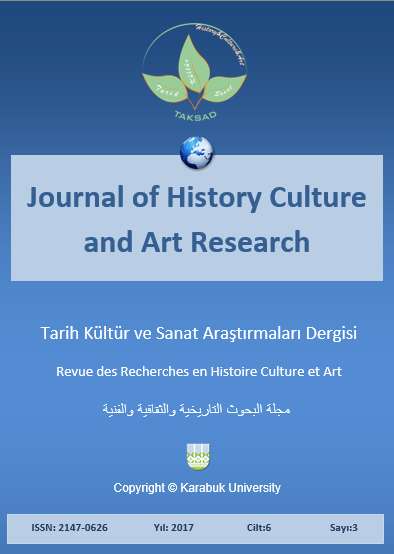Understanding the Notion “Marriage” in British Lingvoculture (By Means of its Verbalization)
Anahtar Kelimeler:
Lingvoculture- Family relations- Marriage- Concept- Language fixation- Social changes.Özet
The article deals with the studying the structure of the subconcept «marriage» in modern British lingvoculture. The subconcept is viewed as one of the basic conceptual structural elements of the concepts sphere “family relations’. The study of the language filling is taken by means of lexicographic description of the lexemes possessing the corresponding to the attractors denotational meaning and studying the literature in the aspect of using the connotational meaning to show the peripheric field. When the linguistic study is done then the subconcept is structurised so that the internal structural features could be viewed and then it could be studied on the aspect of reflecting the social changes of the family phenomenon in the society and find out which changes are reflected in the language. The study resulted in the changes of the traditional structure caused by the social changes. These are the lack of traditional ceremonies resulted in the simplifying of the wedlock, appearing multiple marriages, as well as partners instead of spouses.
Referanslar
Frumkina, R. M., (1989). The Problem of language and mind in the aspect of axiological orientation // Language and cognitive activity. М. P. 66. (In Russian)
Hornby, Nick (2008). How to Be Good. Penguin Books. P.73.
Kacharava M. (2015). Upon Linguistic and Cultural Aspects in Intercultural Communication. Literature and cross‐cultural routes [Mode of Access: http://utopia.duth.gr/~mdimasi/cng/index_htm_files/Maka_Kacharava.pdf].
Kuprieva, I. A., (2014). On the specifics of the research of mental structures verbalization in the synergetic aspect. // Philological sciences. Theoretical and practical issues. No. 10-2 (40). P. 101. [Mode of Access: http://elibrary.ru/item.asp?id=22003206]. (In Russian)
Likhachev, D. S., (1993). Conceptsphere of the Russian language // Russian Academy of Sciences Issues. Conceptosphera russkogo yazyka // Izvestiya Rossiiskoi Academii nauk. Ser. of Lit. and Lang. M. P. 52. No. 1. P. 7. (In Russian)
Merriam-Webster Dictionary of English Language. [Mode of Access: http://www.merriam-webster.com/dictionary]
Online Etymology Dictionary. [Mode of Access: http://www.etymonline.com/].
Oxford Dictionary of English language. [Mode of Access: http://www.oxfordlearnersdictionaries.com/].
Prokhorova O. N., & Smirnova S. B., (2013). Teoreticheskiye predposylki issledovaniya conceptosphery “semeinye otnosheniya”// Nauchnye vedomosti Belgorodskogo gosudarstvennogo universiteta. Seriya: Gumanitarnye nauki. P. 21. No. 6 (177). P.100. (In Russian)
Reid, Carmen (2010). Celebrity Shopper. Transworld Publishers. P.9.
Smirnova, S. B., (2014). Factors of Formation of the Sphere of Concepts. // Politematicheskii Setevoi Nauchnyi Jurnal Kubanskogo Gosudarstvennogo Univarsiteta. Vol. 98. Pp. 1336-1352. (In Russian)
İndir
Nasıl Atıf Yapılır
Sayı
Bölüm
Lisans
Tarih Kültür ve Sanat Araştırmaları Dergisi'nde yayımlanan tüm çalışmalar Creative Commons 4.0 CC-BY lisansı ile lisanslanmıştır.
Bunları yapmakta özgürsünüz:
- Bu eseri her boyut ve formatta paylaşabilir — kopyalayabilir ve çoğaltabilirsiniz.
- Materyalden Adapte et — karıştır, aktar ve eserin üzerine inşa et
- her türlü amaç için, ticari amaç da dahil
Alttaki şartlar altında:
Atıf — uygun bilgiyi, lisansa linki, and ve değişiklik yapıldıysa değişiklik bilgisinivermelisiniz. Sizi veya kullanımınızı lisansörün onayladığı bilgisini içermemek kaydıyla, size uygun şekilde bu işlemleri gerçekleştirebilirsiniz.
AynıLisanslaPaylaş — Eğer materyali karıştırdınızsa, aktardınızsa ya da materyalin üzerine çalıştınızsa, ancak aynı lisans ile dağıtabilirsiniz.
- Ek sınırlamalar yoktur — Lisansın izin verdiği hakları başkaları üzerinde kanunlarla ya da teknolojiyikullanarak sınırlayamazsınız.







